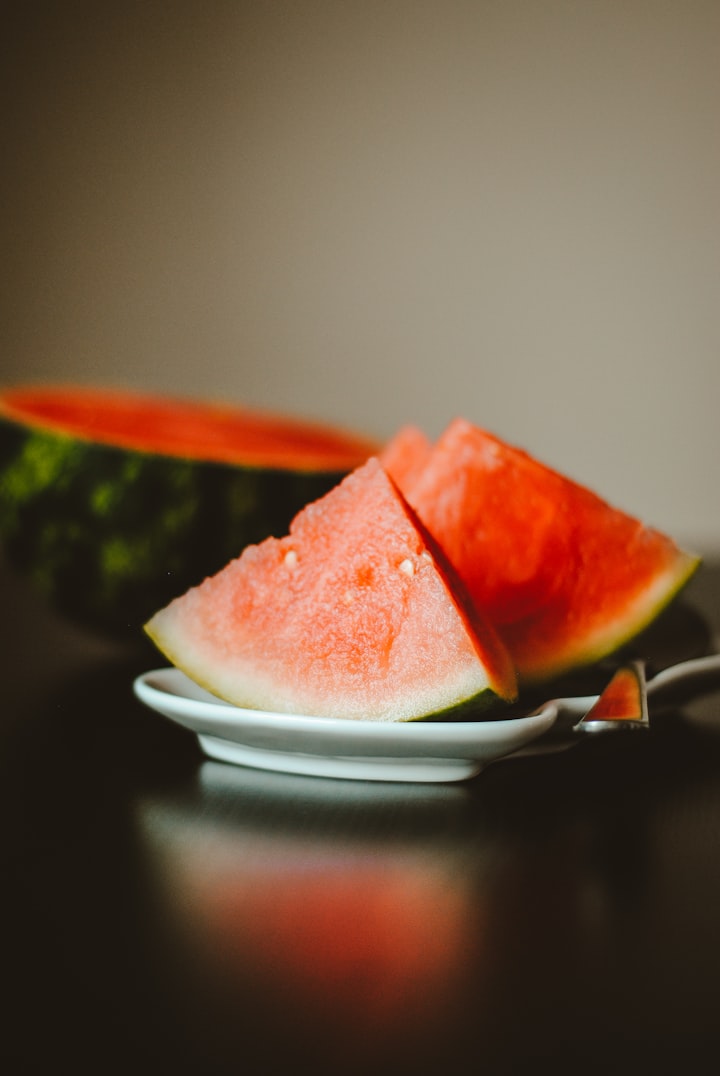Watermelon advantages and risks
Watermelon advantages and risks

WatermelonWatermelon is a low-calorie summer food that is sweet and refreshing. It contains vital elements such as vitamins, minerals, and antioxidants, as well as hydration.
Watermelons belong to the Cucurbitaceae family, which also includes cantaloupe, honeydew, and cucumber.
Watermelon comes in five varieties: seeded, seedless, small, yellow, and orange.
Learn more about the potential health advantages and nutritional composition of watermelon in this article, as well as some serving suggestions and who should avoid it.
*Benefits
Watermelon contains about 90% water, making it ideal for staying hydrated in the summer. Its natural sugars can help satiate a sweet tooth.
Antioxidants can also be found in watermelon. These compounds can aid in the removal of free radicals, also known as reactive species, from the body. During natural activities such as metabolism, the body produces free radicals. Smoking, air pollution, stress, and other environmental factors can all contribute to their development.
Oxidative stress can arise when there are too many free radicals in the body. This can harm cells and lead to a variety of ailments, including cancer and heart disease.
Although the body can naturally eliminate some free radicals, dietary antioxidants aid in this process.
The antioxidants and other nutrients in watermelon may help safeguard a person's health in the following ways.
*Asthma treatment
a few experts Free radicals, according to Trusted Source, have a role in the development of asthma. Certain antioxidants in the lungs, such as vitamin C, may lower the chance of developing asthma.
Although studies have not proven that taking vitamin C supplements can help prevent asthma, a vitamin C-rich diet may provide some protection.
watermelon in a cup
A Trusted Source ball weighing roughly 154 grammes (g) contains 12.5 milligrammes (mg) of vitamin C, or 14 to 16 percent of a person's daily requirements.
What kinds of exercises can people with asthma do? Here's how to find out.
* Blood pressure readings
Watermelon extract was reported to lower blood pressure in and around the ankles of middle-aged persons with obesity and early hypertension in a 2012 study. L-citrulline and L-arginine, two antioxidants found in watermelon, may improve artery function, according to the researchers.
Another antioxidant found in watermelon, lycopene, may help prevent heart disease. It may do so via lowering inflammation connected to high-density lipoprotein (HDL), or "good" cholesterol, according to a 2017 reviewTrusted Source.
Plant substances known as phytosterols may aid in the management of low-density lipoprotein (LDL) or "bad" cholesterol. Some pointers Phytosterols should be consumed in amounts of 2 grammes (g) each day, according to Trusted Source. At 3.08 mg, 154 g of watermelon balls delivers a tiny quantity.
Although lowering LDL cholesterol may help to prevent high blood pressure and cardiovascular disease (CVD), the exact effect of phytosterols on CVD is unknown.
Which meals can aid in the reduction of blood pressure? Here's how to find out.
* Cancer is a serious illness.
Free radicals may play a role in the development of various cancers, according to the National Cancer InstituteTrusted Source (NCI). They can induce DNA cell damage due to the oxidative stress they create.
Watermelon antioxidants, such as vitamin C, may help prevent cancer by combating free radicals in the body.
a few researches
According to Trusted Source, lycopene consumption is associated to a lower risk of prostate cancer.
To discover more about the links between cancer and food, go here.
* Dangers
Most people are unaffected by moderate amounts of watermelon, however some may need to be cautious.
Diabetes: Watermelon is a fruit that contains natural sugars. These carbs must be accounted for in a diabetic's daily food plan. Watermelon should be eaten whole rather than juiced since juicing removes the fibre, making it simpler for the body to absorb the sugar. A glucose surge may be more likely as a result of this. As with other fruits and liquids, keep portion amounts in mind.
After eating watermelon, some people may experience adverse reactions such as hives, edoema, and difficulty breathing. If this happens, the person should seek medical help since anaphylaxis, a life-threatening allergic reaction, can occur.





Comments
There are no comments for this story
Be the first to respond and start the conversation.